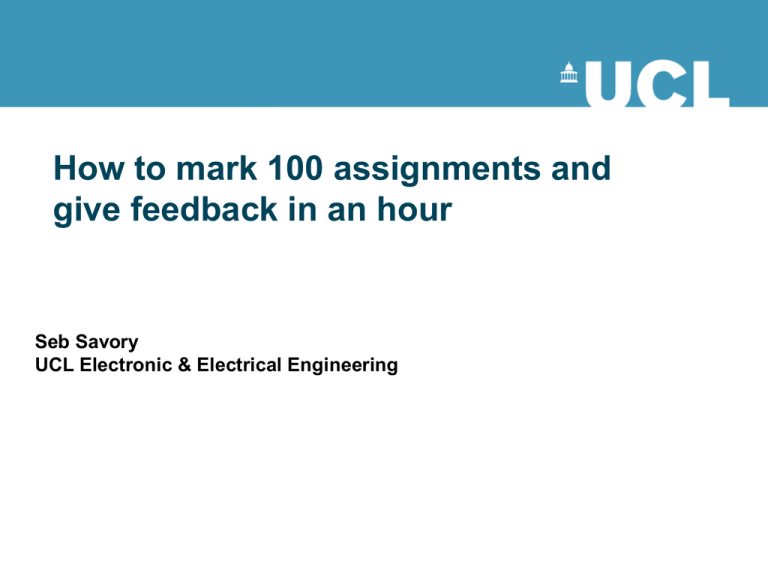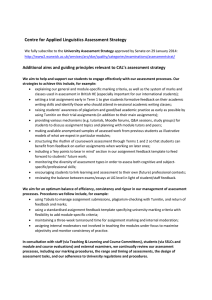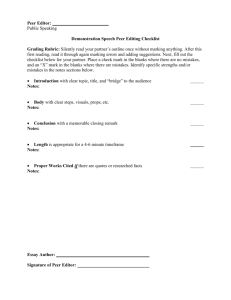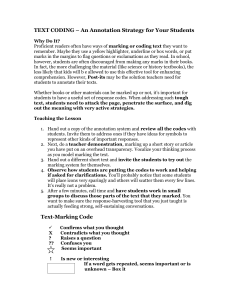How to mark 100 assignments and give feedback in an hour
advertisement

How to mark 100 assignments and give feedback in an hour Seb Savory UCL Electronic & Electrical Engineering Optical Networks The problem 1 • Engineering mathematics benefits from students carrying out regular assignments to test their understanding of lecture material • Given the cumulative nature of the topics near instant feedback is desirable, since one needs to have mastered one topic before progressing to the next • In 2007/08, moved from 20% of marks from a midsessional test to 20% of the final mark obtained from assignments with each assignment worth 2-3% of final exam Optical Networks Possible solutions 2 • Use computer based marking – Generally needs multiple choice questions – Not explored, for three reasons • At present we can only check the final answer, not the method and explanation/assumptions which often are as important • We want to encourage the “engineering disciplinarity” which starts with rough sketch etc. • When we started it was in 2007 – pre-moodle @ UCL • Use academics to mark assignment – Staff time per 0.5CU increased by ~ 300% - not practical • Use PhD students / postdocs – Used this from when assignments first introduced in 2007/08, but turnaround is variable (two weeks) Optical Networks Proposed solution • Parallel processing - peer marking – Get students to mark each others assignments in lectures – Can thus provide rapid feedback • During a lecture the model solutions are presented by the lecturer, including the mark scheme and students mark (and also provide comments), on their peers scripts 3 Optical Networks Implementation – 1st iteration (2008/09) 4 • Submission – Students submit their assignments to departmental office by a fixed deadline – Record of submissions noted • Peer marking (for 5 out of 10 assignments) – Students collected an assignment (but not their own) at the start of the lecture – Incentive to attend: Students required to attend a peer marking session to get full marks • Even though students were advised that their marks would be halved if they failed to attend the peer marking session, some failed to attend • Mismatch results in some assignments still needing to be marked Optical Networks Implementation – 2nd iteration (2010/11) 5 • Combine submission deadline and peer marking (for 5 out of 10 assignments) – Students arrive for the lecture, then swap with a neighbour – Peer markings ensues – Marked script is returned to the student by the marker – Student returns marked script to the lecturer • Script marking checked by lecturer and also compared to marks for PhD marked assignments – No variation found to occur Optical Networks Implementation – 3rd iteration (2012/13) 6 • All assignments peer marked – As per the 2nd iteration, students bring assignments to lectures and then swap with a neighbour – Number of assignments reduced to 7 (3 first term and 4 second term, to reduce competition with other work) – Will review and possibly reduce to 6 next year • Current arrangement this term (2 lectures per week) • • • • Lecture Lecture (assignment given) Lecture Peer marking – And then repeats.. Optical Networks Issues with peer marking 7 • Latecomers can be highly disruptive – Solution is to have a very clear set of rules • Students sometimes struggle with marking their peers work, particularly when it is poorly presented or contains errors – This is useful in that it highlights to students the importance of presenting clear solutions – Often if it contains errors, markers will highlight the error and what should have been done on the marked script Optical Networks “The rules” – emailed the day before.. 8 • Name and tutor's name to appears on front page of stapled solutions (marks deduced for failing to do so) • Peer marking begins at 1005 precisely. Latecomers will get zero for all questions which have been peer marked (essential to avoid disruption of latecomers) • Failure to attend fail will forfeit the marks for the assignment (with a few exceptions) – For anticipated absence solutions must be submitted in advance (either physically or via email) – A doctors note can be produced for illness – Newsworthy/catastrophic problems with public transport which can external be verified via TfL or train websites Optical Networks Draconian but necessary 9 • While these rules might seem excessive, latecomers are so disruptive to the lecture that this is necessary – When someone late arrives, I halt the peer marking, then write on their script the questions for which solutions have been given out, then continue with the peer marking – Peer marking session 1: Two latecomers – Peer marking session 2: No latecomers Optical Networks Final thoughts and observations 10 • Assignments encourage students to engage with lecture material and will work disproportionally hard to get 2-3% • Submission at peer marking session and swapping with a neighbour works well • For peer marking assignments should be short enough to be marked in 40 minutes, allowing for 5 minutes at the start and end of a lecture to perform the necessary admin. • Peer marking encourages attendance at a tutorial session where students have to sit through seeing ideal solutions presented, getting feedback within the hour.. Optical Networks 11 Questions




